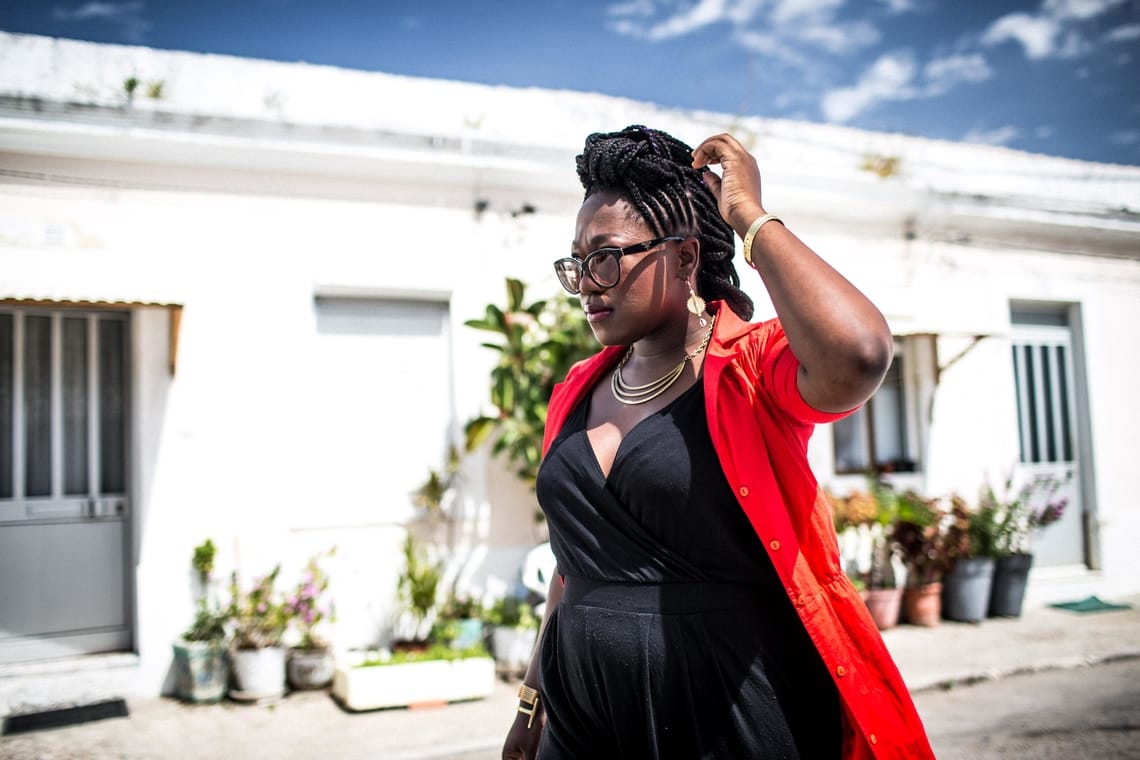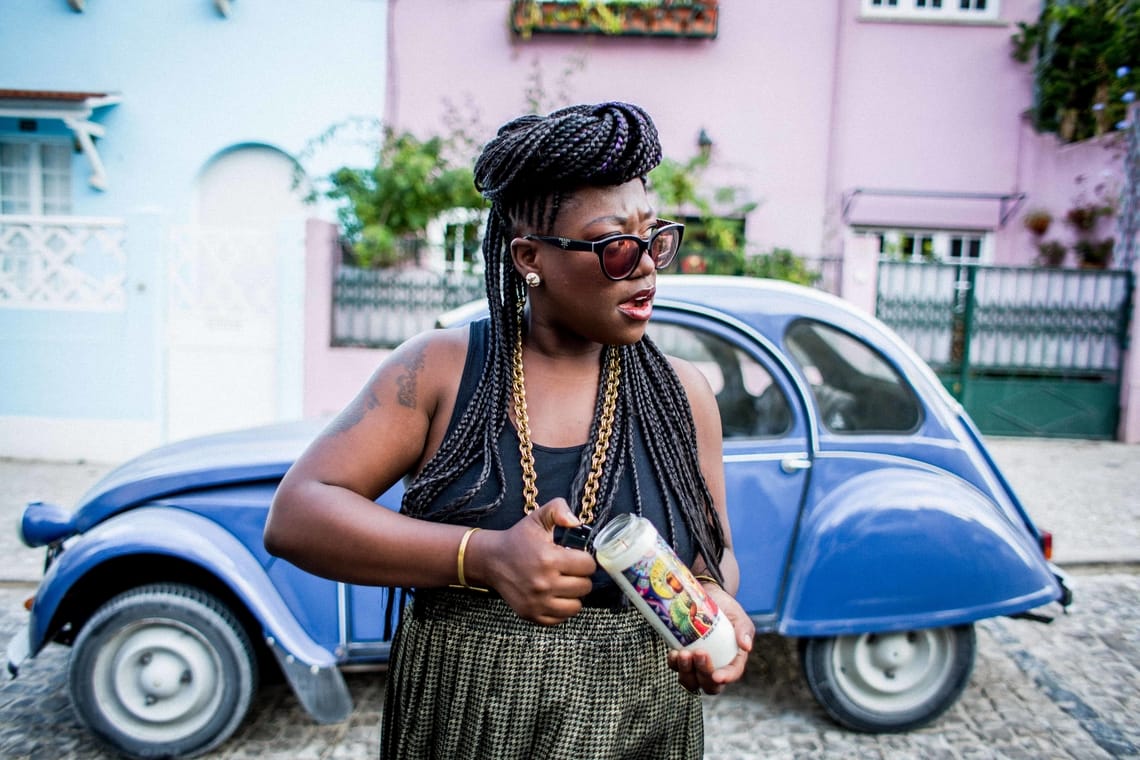
Mélissa Laveaux releases her third album, Radyo Siwel. Sung exclusively in Creole, the album is a tribute to her Haitian heritage.
French version published for the the first time the February 6th 2018
Photo: Romain Staros Staropoli
Mélissa Laveaux is determined to reinvent herself. With Radyo Siwèl, she steps forward by stepping back to the past, that is, the past of her parent’s birthplace: Haiti.
Although only fragments and traces of the past remain, the memories burn bright. Her album title speaks directly to this idea. “Radyo,” denotes the idea of a transmission that can get lost. “Siwel,” alludes to the popular songs of of the Bann ‘na Siwèl, or the troubadour orchestras, that through their poetic lyrics, conveyed the history and identity of the Haitian people and stood testimony to their resistance.
“There were songs where I did not have the melody, so I drew upon different memories and parts of my childhood, and that’s where the ideas came from.”
Yet, the album is not exactly in the troubadour style. The Canadian revisits the Haitian repertoire in her own way, with her own unique interpretation, history, and energy. She says, “There were songs where I did not have the melody, so I drew upon different memories and parts of my childhood, and that’s where the ideas came from.” Her album is refined by the arrangements of the trio A.L.B.E.R.T., who did wonders with Oumou Sangaré‘s album, and is boosted by the verve of calypso-inclined Drew Gonsalves, of Kobo Town.

Appropriating Her Roots
Mélissa Laveaux, born in Montreal, grew up in Ottawa. Her parents left Haiti at the age of 18 before settling in Canada. Explaining their story, Laveaux recounts, “They had left the island when they were students, because some friends of theirs, who were militants, were killed. It was under the regime of Papa Doc (François Duvalier). My father left first and he raised money to sponsor my mother’s trip to Canada.”
Raised in an English-speaking town, her parents did not really teach her Creole. She grew up with hip-hop, electronic and Brazilian music. Actually, she listened to very little Haitian music (barring her parents’ big parties where everyone danced to Konpa). Yet, there was one record in particular that she listened to, the record of Martha Jean-Claude. She is one of the first female voices she can remember. “I would not have become a singer if I had not remembered her voice. There is a particular grain to her voice. Martha Jean-Claude is like a kind of guide to me. In my first album, Camphor & Copper, I sang one of her songs (Editor’s note: “Dodo Titit »).
Return to Haiti
In April 2016, Mélissa Laveaux left for Haiti, twenty years after the last holidays she spent in the Cap-Haïtien region. She knew only a few figurative Creole expressions, mostly from her mother’s phone conversations with her aunts, when they would exchange zins (the latest gossip).
In Haiti, Laveaux got a hold of recordings and notebooks, but also people’s stories. Although the memories were scattered around in bits and pieces, they were all still so alive. She listened to those constantly reinvented songs that were present throughout the long and tortuous history of Haiti. One of the periods that Mélissa focuses on is the occupation of the island by the United States, from 1915 to 1934.
She came back from the trip not only with sounds and melodies but with atmosphere and narrative — everything necessary to compose her musical masterpiece. This is what Radyo Siwèl is about. Laveaux forges together fragments, phrases, old tunes, and voodoo hymns and assembles them bit and piece into a patchwork of identity. Then, with her rock energy and edgy, deep guitars, she gives life to the patchwork identity through her voice.
“When you are a refugee, no one needs to know your past, to know where you come from. You can build another past, to shape what you want to happen next. That was my freedom: choosing elements, shaping them together, telling a story.”
Radyo Siwel definitely recounts the history of Haiti but it also tells the story of a re-imagined history, written by Laveaux, who only knows the country through the eyes and stories of her exiled parents. “When you are a refugee, no one needs to know your past, to know where you come from. You can build another past, to shape what you want to happen next. That was my freedom: choosing elements, shaping them together, telling a story. Like an imaginary biography; we can imagine that this person would have had one type of conversation, that she could have said that … And that’s how I created these pieces. They hail from this Haitian heritage. “Twa Fey” (“Three Leaves”) illustrates it well. It is an old Haitian folklore song. I imagined that people were participating in a ceremony.”
Looking at Mélissa Laveaux’s journey, one can see that going back to one’s roots has the power to liberate. Laveaux likens her relationship with Haiti to hearing a voice over the radio, like a signal that got scrambled before reaching her, delivering only a few words, and in those spaces in between the words is the freedom to fill in the blanks. This is undoubtedly the strength of Radyo Siwel. It’s a pop album that is also focused on her “roots.” It’s loaded with the treasures of a collective history as well as those of the artists’ history. It is at once dark and sunny, political and sometimes mischievous, just like those old Haitian songs that mock the American oppressors or evoke thinly veiled metaphors on sexual ecstasies. Mélissa Laveaux met Haiti, and found herself.



